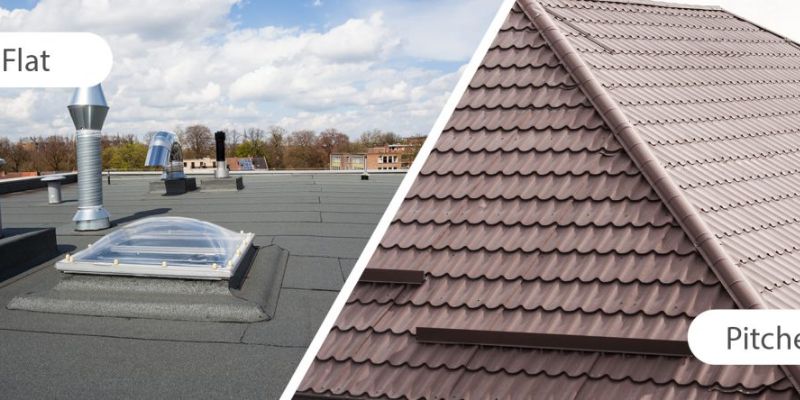In the world of architecture and construction, roofs play a crucial role in providing protection and defining the overall aesthetic of a building. When it comes to selecting the right roof for your property, understanding the differences between a pitched roof and a flat roof is essential. In this article, we will explore “What is the Difference Between a Pitched Roof Vs Flat Roof?”, highlighting their unique features, advantages, and drawbacks. So, let’s dive in and unravel the key dissimilarities between a pitched roof and a flat roof!
What is the Difference Between a Pitched Roof Vs Flat Roof?
Here are the key differences between a pitched roof and a flat roof presented in bullet points:
Pitched Roof:
- Has a sloping or angled design.
- Consists of two or more sloping sides.
- Allows water and snow to easily run off.
- Provides better drainage and prevents water pooling.
- Offers enhanced structural stability.
Flat Roof:
- Has a horizontal or low-slope design.
- Comprises of a single, level surface.
- Requires proper waterproofing to prevent leakage.
- Offers additional usable space for outdoor activities.
- Provides easier access for maintenance and repairs.
Advantages of a Pitched Roof
A pitched roof offers several advantages over a flat roof, including:
- Improved Drainage: The sloping design of a pitched roof allows rainwater and snow to quickly drain off, reducing the risk of leaks or water pooling.
- Enhanced Durability: Pitched roofs are known for their longevity and ability to withstand harsh weather conditions such as heavy rain, snow, and strong winds.
- Classic Aesthetic Appeal: Pitched roofs are often associated with traditional and aesthetically pleasing architectural styles, adding a timeless charm to any building.
- Increased Attic Space: The angled structure of a pitched roof creates additional space within the attic, providing potential for storage or even conversion into living areas.
Advantages of a Flat Roof
While flat roofs have their own set of advantages, including:
- Easy Accessibility: Flat roofs are easier to access for maintenance, repairs, and installation of rooftop equipment such as solar panels or HVAC systems.
- Cost-Effective Construction: Building a flat roof typically requires less material and labor compared to a pitched roof, resulting in cost savings during construction.
- Usable Outdoor Space: The flat surface of a flat roof can be transformed into a rooftop garden, outdoor seating area, or recreational space, maximizing the utility of the property.
- Modern and Minimalist Aesthetic: Flat roofs are often associated with contemporary architectural designs, offering a sleek and minimalist appearance to the building.
Drawbacks of a Pitched Roof
Despite their numerous advantages, pitched roofs also come with some drawbacks, including:
- Higher Construction Costs: The complex structure of a pitched roof requires more materials and labor, leading to higher construction costs compared to a flat roof.
- Limited Usable Space: The sloping sides of a pitched roof limit the amount of usable space within the attic, restricting its potential for conversion or storage.
- Maintenance Challenges: Cleaning and maintaining a pitched roof can be more challenging due to its height and angle, requiring specialized equipment and expertise.
Drawbacks of a Flat Roof
While flat roofs have their merits, they also have certain drawbacks, such as:
- Prone to Leakage: Without proper installation and regular maintenance, flat roofs are more susceptible to leaks and water damage compared to pitched roofs.
- Shorter Lifespan: Flat roofs tend to have a shorter lifespan than pitched roofs, as they are exposed to weathering, UV radiation, and potential pooling of water.
- Limited Drainage: Flat roofs require meticulous installation of waterproofing membranes and proper drainage systems to prevent water from accumulating and causing structural issues.
FAQs about the Difference Between a Pitched Roof vs Flat Roof
Here are some frequently asked questions about the difference between a pitched roof and a flat roof:
Q: Which roof type is more suitable for a residential property?
A: Both pitched and flat roofs have their advantages for residential properties. The choice depends on factors such as architectural style, climate, and personal preferences.
Q: Can a flat roof be converted into a pitched roof?
A: Converting a flat roof into a pitched roof involves significant structural modifications and is often not a viable option without substantial renovation.
Q: Which roof type requires less maintenance?
A: Generally, pitched roofs require less frequent maintenance due to their natural water runoff and better resistance to weather elements.
Q: Are flat roofs only suitable for commercial buildings?
A: While flat roofs are commonly used in commercial buildings, they can also be suitable for residential properties, especially those with modern architectural designs.
Q: Do flat roofs have any pitch at all?
A: Flat roofs have a slight pitch or slope, often referred to as a low slope, to ensure proper water drainage and prevent water from pooling.
Q: Which roof type offers more design flexibility?
A: Pitched roofs provide more design flexibility due to their varied styles, including gable, hip, mansard, and butterfly roofs.
Wrap Up
Understanding the differences between a pitched roof and a flat roof is crucial when it comes to making an informed decision about the right roof for your property. While pitched roofs offer better drainage, enhanced durability, and classic aesthetic appeal, flat roofs provide easy accessibility, cost-effectiveness, and the potential for usable outdoor space.
Consider factors such as climate, architectural style, maintenance requirements, and personal preferences to choose the roof type that best suits your needs. Whether you opt for the timeless charm of a pitched roof or the modern functionality of a flat roof, make sure to prioritize proper installation, regular maintenance, and effective waterproofing to ensure the longevity and performance of your roof.


brand cenforce 100mg – cenforce 50mg over the counter buy cenforce 100mg sale